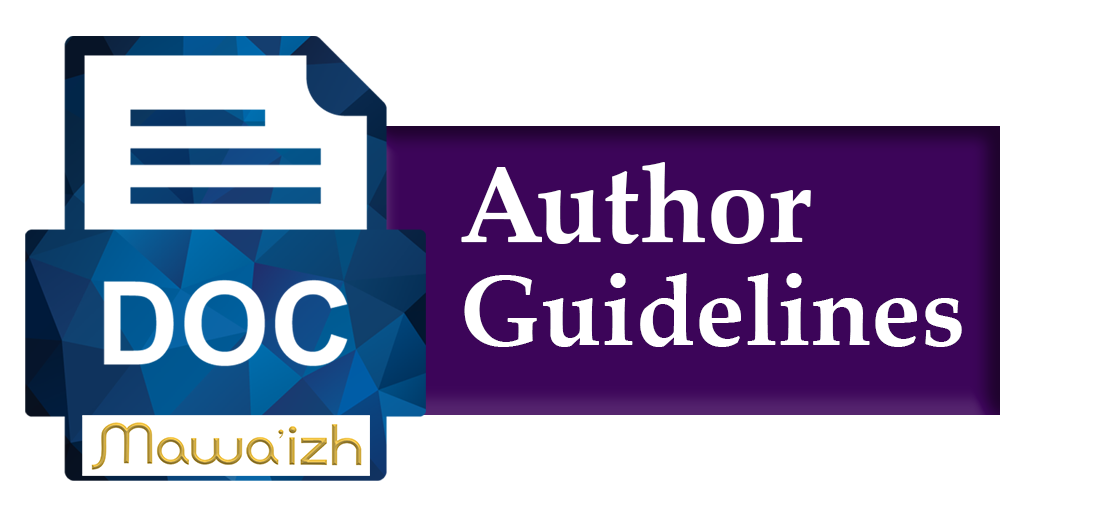
Publication Ethics
Publication Ethics
Mawaizh : Jurnal Dakwah dan Pengembangan Sosial Kemanusiaan (E-ISSN 2614-5820) is a peer-reviewed scientific journal published by the Faculty of Da'wa and Islamic Communication, IAIN Syaikh Abdurrahman Siddik Bangka Belitung. This statement clarifies the ethical behaviour of all parties involved in the act of publishing an article in this journal, including the author, the chief editor, the Editorial Board, the peer-reviewer and the publisher This statement based on COPE’s Best Practice Guidelines for Journal Editors.
Ethical Guidelines for Journal Publication
Mawaizh : Jurnal Dakwah dan Pengembangan Sosial Kemanusiaan aims to be a forum for the dissemination of ideas and research results in the fields of da'wa, communication, science and social affairs. Published articles are an important building block in the development of a coherent and respected network of knowledge. This is a direct reflection of the quality of the work of the authors and the institutions that support them. Peer-reviewed articles support and embody the scientific method. Standards of ethical behavior are important for all parties involved in publishing articles on Mawaizh.
Publisher
Faculty of Da'wa and Islamic Communication as the publisher of the Mawaizh : Jurnal Dakwah dan Pengembangan Sosial Kemanusiaan takes the duties of all stages of publication very seriously and are aware of ethical and other responsibilities. We are also committed to ensuring that advertising, reprint, or other commercial revenue does not impact or influence editorial decisions.
Editors and Publications
Editors at all times evaluate manuscripts for their intellectual content regardless of the author's race, gender, sexual orientation, religious beliefs, ethnic origin, nationality, or political philosophy.
Mawaizh : Jurnal Dakwah dan Pengembangan Sosial Kemanusiaan is responsible for deciding which article manuscripts are sent to be published in the journal. Articles to be published must follow Mawaizh's ethical standards for publication with the applicable requirements, related to copyright infringement and plagiarism. The editor can confer with other editors or administrators in making this decision.
Confidentiality
Editors and other editorial staffs at Mawaizh : Jurnal Dakwah dan Pengembangan Sosial Kemanusiaan do not disclose any information about the manuscript submitted to anyone other than the author, journal manager, editorial advisor and publisher.
Conflict of Interest
Manuscripts which are not published may not be used in the editor's own research without the written consent of the authors.
Editorial Decision Contribution
Peer reviews assist editors in making editorial decisions and through the editorial communication with authors can also assist authors in improving papers.
Speed
Reviewers who are selected to review the manuscript but feel ineligible to review the manuscript may immediately notify the editor and will be replaced by another reviewer.
Standard of Objectivity
Reviews must be conducted objectively. The author's personal criticism is inappropriate. Referees must express their views clearly with supporting arguments.
Plagiarism Plug
Mawaizh : Jurnal Dakwah dan Pengembangan Sosial Kemanusiaan is a scientific journal that is managed through a plagiarism check process. Before submitting the manuscript for review, the editor does a plagiarism check. Manuscripts must be free from plagiarism content, the maximum similarity limit is 20%.
Author's Duties and Reference Sources
If the article manuscript is based on research results, the author must attach raw data in the form of observations, interviews, etc. This aims to determine the research process carried out by the editorial team. The author is obliged to mention the source of the reference if the author cites the thoughts of other authors.
Duties of Authors
Reporting standards
Authors of reports of original research should present an accurate account of the work performed as well as an objective discussion of its significance. Underlying data should be represented accurately in the paper. A paper should contain sufficient detail and references to permit others to replicate the work. Fraudulent or knowingly inaccurate statements constitute unethical behaviour and are unacceptable.
Data Access and Retention
Authors are asked to provide the raw data in connection with a paper for editorial review. The author should also prepare to provide public access to such data (consistent with the ALPSP-STM Statement on Data and Databases), if practicable, and should in any event be prepared to retain such data for a reasonable time after publication.
Originality and Plagiarism
The authors should ensure that they have written entirely original works, and if the authors have used the work and/or words of others that this has been appropriately cited or quoted.
Multiple, Redundant or Concurrent Publication
An author should not, in general, publish manuscripts describing essentially the same research in more than one journal or primary publication. Submitting the same manuscript to more than one journal concurrently constitutes unethical publishing behaviour and is unacceptable.
Acknowledgement of Sources
Proper acknowledgement of the work of others must always be given. Authors should cite publications that have been influential in determining the nature of the reported work.
Authorship of the Paper
Authorship should be limited to those who have made a significant contribution to the conception, design, execution, or interpretation of the reported study. All those who have made significant contributions should be listed as co-authors. Where there are others who have participated in certain substantive aspects of the research project, they should be acknowledged or listed as contributors. The corresponding author should ensure that all appropriate co-authors and no inappropriate co-authors are included on the paper and that all co-authors have seen and approved the final version of the paper and have agreed to its submission for publication.
Hazards and Human or Animal Subjects
If the work involves chemicals, procedures or equipment that have any unusual hazards inherent in their use, the author must clearly identify these in the manuscript.
Disclosure and Conflicts of Interest
All authors should disclose in their manuscript any financial or other substantive conflicts of interest that might be construed to influence the results or interpretation of their manuscript. All sources of financial support for the project should be disclosed.
Fundamental errors in published works
When an author discovers a significant error or inaccuracy in his/her own published work, it is the author’s obligation to promptly notify the journal editor or publisher and cooperate with the editor to retract or correct the paper.
Duties and Responsibilities of Reviewers
Contribution to Editorial Decisions
Peer review assists the editor in making editorial decisions and through the editorial communications with the author may also assist the author in improving the paper.
Promptness
Any selected referee who feels unqualified to review the research reported in a manuscript or knows that its prompt review will be impossible should notify the editor and excuse himself from the review process.
Confidentiality
Any manuscripts received for review must be treated as confidential documents. They must not be shown to or discussed with others except as authorized by the editor.
Standards of Objectivity
Reviews should be conducted objectively. Personal criticism of the author is inappropriate. Referees should express their views clearly with supporting arguments.
Acknowledgment of sources
Reviewers should identify relevant published work that has not been cited by the authors. Any statement that an observation, derivation, or argument had been previously reported should be accompanied by the relevant citation. A reviewer should also call to the editor's attention any substantial similarity or overlap between the manuscript under consideration and any other published paper of which they have personal knowledge.
Disclosure and Conflict of Interest
Privileged information or ideas obtained through peer review must be kept confidential and not used for personal advantage. Reviewers should not consider manuscripts in which they have conflicts of interest resulting from competitive, collaborative, or other relationships or connections with any of the authors, companies, or institutions connected to the papers.






.gif)












